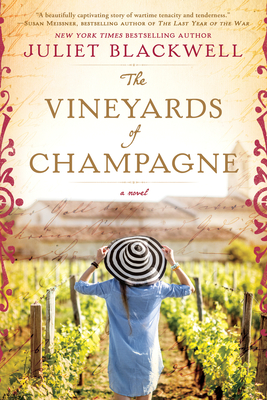
THE VINEYARDS OF CHAMPAGNE
By: Juliet Blackwell
Published: January 21, 2020
Publisher: Berkley
Fiction/Historical Fiction

Rosalyn is still grieving the death of her husband. But, her job and her boss, whom she owes many favors, is requiring her to travel to Champagne, France. As a wine seller, she is going to try to sign some champagnes to their Napa Valley winery. While on the flight, she meets Emma. Emma is traveling to Champagne to do research on WWI. Emma has letters that went back and forth from the trenches of the war to the caves of Champagne. During the war, people fled to the caves. There were whole villages living in the tunnels and caves underneath the vineyards. There were schools and businesses, and it was the only way people survived during the war. Rosalyn, while meeting with winery owners, finds herself pulled into the stories of Emile and Lucie and their letters.
This story is told mainly in the present day with letters from Emile sprinkled throughout. There are a few chapters told from Lucie’s perspective as well. The story moves through the present as Rosalyn, Emma, and their friends connect the stories in the letters and learn about the fate of Emile and Lucie.
I had a difficult time reading about the caves and the people living in them and even visiting them during the present day. With 116 steps down, they were deep underground, especially if they kept the villagers safe while their homes were being bombed during the war. As someone who gets claustrophobic, I had to keep reminding myself to take deep breaths during these parts of the book. The amazing thing is that these caves were real and the book is based on real events during WWI in Champagne, France. It is unimaginable to me how hundreds of people lived underground for months and years…going days without seeing any light of day.
“The dead lie unburied and unconsecrated above ground, while the living cower deep beneath the surface of the earth. The world, upside down.”
Lucie – THE VINEYARDS OF CHAMPAGNE
Blackwell incorporates the French language into the story which makes the characters and the setting very authentic. Her descriptions of places and food and the bubbly champagne make me want to visit there immediately. Her characters have many layers and each is dealing with something difficult, some just more secretly than others.
Blackwell handles Rosalyn’s grief well, not shying away from bold feelings or loneliness, despair, or fear of the future. Each character had a unique voice and felt authentic and true to their story. Nothing felt fluffy or trite to me in this book.
One reason I love reading historical fiction is that I usually learn some truth from history that I didn’t know before. That is the case with this novel and I appreciate Blackwell sharing this WWI story, the caves, and the unique vineyards and style of growing grapes to make champagne. I will definitely be more curious about the labels the next time I have a bottle of champagne.
There is much loss in this novel, but there is also hope. The people of Champagne had to endure months of war in the caves and they were a hearty people to persevere. Rosalyn was enduring months and years of grief and anger and loss, but she also needed to persevere to find joy in her life. The past and the present stories flowed well and as a reader, I longed for the stories of the past as much a Rosalyn longed to find the answers.
Fans of historical fiction, dual time-period stories, and war settings will enjoy this novel. For more information as well as a Book Club Kit including facts about drinking champagne, a conversation with the author, a playlist, and discussion questions, check out the author’s website, HERE.
To purchase a copy of THE VINEYARDS OF CHAMPAGNE, click the photo below:

Other books you might like:
Thanks to the author for sending a copy of this book for the purpose of this review. This review is my honest opinion. If you choose to make a purchase through the above links, I may receive a small commission without you having to pay a cent more for your purchase.
Posted Under Book Review, historical fiction, Juliet Blackwell, WWI
